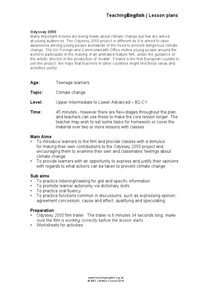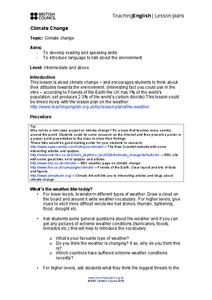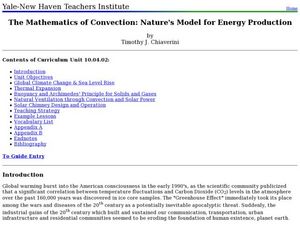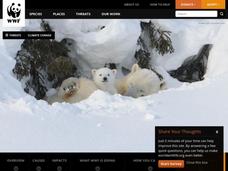Curated OER
Odyssey 2050
Young scholars view and respond to The Odyssey 2050 film. In this climate change lesson, students view the film and discuss ways to take action to stop global warming. Young scholars complete several activities prior, during, and...
Curated OER
Climate Change
Students brainstorm types of weather present threats to the world, specifically climate change and the environment. In this climate change lesson, students complete and discuss a set of worksheets about "going green," climate change,...
Curated OER
A Coastal Arctic Food Web
Students create a food web of the arctic ecosystem. For this biology lesson, students explain how global warming affects this ecosystem. They explain how losing a species affects the entire community.
Curated OER
The Energy Debate - Sea Level Rise
Students comprehend the impact of global warming on our coastal cities. They appreciate how geographic information systems can be used to represent scientific data. Students research the melting of the ice caps in Antarctica and the Arctic.
Curated OER
Hot Stuff!
Young scholars observe different demonstrations on the greenhouse effect. They build their own models to show the phenomenon. They discus the role of greenhouse gases on global warming.
Curated OER
Local and Global Impacts
Students conduct an interview with Dr. Hajo Eicken to discuss local and global impacts. They hold an audio conference to ask about characteristics of the Arctic environment, climate, climate change, the greenhouse effect and global...
Curated OER
Why is the Average Temperature Greater on Venus than on Mercury?
Students examine the reasons why the temperature is higher on Venus than on Mercury. In groups, they analzye both planet's atmospheres and determine the rate of global warming on each. They use the internet to research the planets in...
Curated OER
Possible Causes
Pupils review any materials from two previous lessons on emissions. As a class, they use a graphic organizer to review their stakeholder's hypothesis. They identify possible causes of global warming and discover how to solve this problem.
Curated OER
The Common Tragedy of Consumerism
Students evaluate the effectiveness of current climate change solutions. In this global warming lesson, students look at the current measures implemented and analyze whether they are beneficial to the environment or not. Advance reading...
Curated OER
Loss of Wetlands: Subsidence
Students observe subsidence and the effect it has on wetlands with a classroom demonstration. They think about the impact of global warming and the sea level and how it affects the marsh.
Curated OER
Let's Get To the Core!
Students practice analyzing ice core samples to discover climate changes. Using the samples, they identify and graph the gas amounts. They use these numbers to determine their effect on global warming. In pairs, they complete a...
Curated OER
Help Save the Polar Bear
Students use ice cubes to demonstrate how the polar ice caps are melting and how it effects the polar bears. In this polar bear lesson plan, the teacher explains how polar bears live on the north pole and how they are having trouble due...
Curated OER
Fighting for Control
Engage your class in a class discussion examining and defend different sides of an argument about whether the Environmental Protection Agency should have the legal authority to regulate carbon dioxide emissions. They will have to...
Center Science Education
Feeling the Heat
What is an urban heat island? Middle school meteorologists find out by comparing temperatures at different locations on campus. They relate their findings to what might be happening in a concrete jungle and how it impacts local weather....
Curated OER
The Mathematics of Convection: Nature's Model for Energy Production
High schoolers conduct a series of experiments to investigate density, buoyancy and climate. In this math lesson plan, pupils design and build a hot air balloon to demonstrate convection. They research and write a paper about solar...
Center Science Education
CO2: How Much Do You Spew?
Split your earth science or environmental studies class into groups and give each a scenario card. Scenario cards describe the lifestyles of 10 different fictitious families, focusing on their energy usage. Carbon dioxide emissions are...
San José State University
Commonly Misused Words
After reviewing two pages of commonly misused words: effect/affect, accept/except, there/their/they're, etc., learners must choose the proper word in ten different sentences. Note: Answers are listed at the bottom of page three.
Teach Engineering
Introduction to Water Chemistry
What are the issues surrounding water quality? Viewers of this short presentation gain information about the importance of clean water, the lack of fresh water, water contamination, and ways that engineers treat water.
Curated OER
Climate Change in My City
Students investigate the climate changes occurring locally, regionally and globally over the last one hundred years. They brainstorm and predict whether the current year's weather was warmer or colder than last year then check the...
National Wildlife Federation
Hot, Hotter, Hottest: Extreme Weather's Impact on Our Resources
How dry is it? It's so dry, the river only runs twice a week! Through an analysis of maps and discussions, pairs learn about droughts across the United States in the ninth of 12 lessons. They then read about, answer questions, analyze...
Curated OER
Climate Change And Disease
High schoolers consider the role of climate change in the occurrence of vector born diseases such as malaria. In small groups, they research a specific vector to complete an information chart on climate changes in the region where the...
SF Environment
Pre-School Composting and Recycling!
You can never be too young to get involved in composting or recycling. Here is a lesson that has been made for the very littlest learners and it's all about the importance of conservation. They'll sort compostable and recyclable objects,...
UAF Geophysical Institute
Carbon Footprint
Your young environmentalists can calculate their carbon footprint and discuss ways to reduce it with a worksheet about climate change. After reading a handout about what impact one's carbon footprint can have on the environment, kids...
NOAA
History's Thermometers
How is sea coral like a thermometer? Part three of a six-part series from NOAA describes how oceanographers can use coral growth to estimate water temperature over time. Life science pupils manipulate data to determine the age of corals...
Other popular searches
- Global Warming Worksheet
- Global Warming Recycling
- Global Warming Activities
- Global Warming Ozone
- Global Warming Projects
- Global Warming Labs
- Global Warming Lesson Plans
- Global Warming Affects
- Geography Global Warming
- Global Warming and Trees
- Environment Global Warming
- Global Warming Research

























